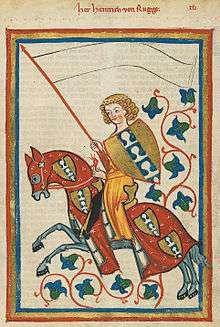caparison
English

Knight on caparisoned steed
Etymology
From Middle French caparaçon, from Old Spanish caparazón, from Old Occitan capairon.
Noun
caparison (plural caparisons)
- The often ornamental coverings for an animal, especially a horse or an elephant.
- 1861, Charlotte Guest (translator), The Mabinogion/The Dream of Rhonabwy:
- And the green of the caparison of the horse, and of his rider, was as green as the leaves of the fir-tree, and the yellow was as yellow as the blossom of the broom.
-
- Gay or rich clothing.
- 1749, Tobias Smollett, The Regicide:
- My heart groans beneath the gay caparison.
-
Translations
coverings for an animal, often ornamental
Verb
caparison (third-person singular simple present caparisons, present participle caparisoning, simple past and past participle caparisoned)
- To dress up a horse or elephant with ornamental coverings.
- 1593, Shakespeare, Richard III, Act 5, Scene 3.
- Come, bustle, bustle; caparison my horse
- 1593, Shakespeare, Richard III, Act 5, Scene 3.
This article is issued from
Wiktionary.
The text is licensed under Creative
Commons - Attribution - Sharealike.
Additional terms may apply for the media files.